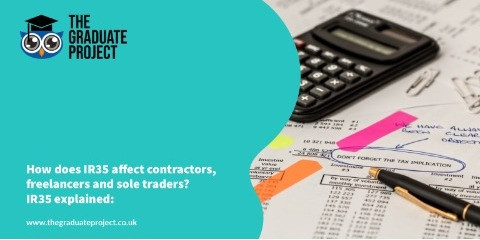Search Vacancies
Blog
How does IR35 affect contractors, freelancers and sole traders?
- May 21, 2021

IR35 is a word used to describe two sets of tax legislation that are designed to combat tax avoidance by workers and the firms hiring them, specifically targeting those who are supplying their services to clients via an intermediary, such as a limited company.
Such workers are called ‘deemed employees’ by Her Majesty’s Revenue and Customs (HMRC). If caught by IR35, they have to pay income tax and National Insurance Contributions (NICs). The financial impact of IR35 is significant. It can reduce the worker’s net income by up to 25%, costing the typical limited company contractor thousands of pounds in additional income tax and NICs.
Inside IR35 is HMRC’s term for individuals registered as limited companies that act like employees and are in violation of this regulation.
Companies that do not violate IR35 are known as “outside IR35” and won’t face any additional fees or penalties. Even if they’re a one-person business, these companies operate independently from their clients and choose when, where and how they work.
What has changed?
In April this year, new off-payroll working rules were introduced. Medium and large-sized private sector employers are now responsible for determining whether IR35 rules apply - as well as the liability for any underpaid tax. Previously it was the responsibility of the contractor to determine their employment status.
You may be affected by the rules if you are:
- a worker who provides their services through their intermediary
- a client who receives services from a worker through their intermediary
- an agency providing workers’ services through their intermediary.
HMRC can examine the contractor’s tax status at any time. When evaluating whether someone is inside or outside IR35, HMRC will consider the three following factors:
- Control. How much power does the business have over what, how, when and where the contractor completes the assignment? The more control, the more likely the contractor is inside IR35.
- Substitution. Can someone else complete the assignment or is it contractor and person-specific? You’re more likely to be inside IR35 if the latter applies.
- Mutuality of obligation. Is the business obligated to provide work? Must the contractor accept it? If the answer is yes, then you’re probably operating inside IR35.
What is the impact of IR35 on workers?
It is estimated that around 500,000 contractors will be impacted by the legislation. If an employer has determined that IR35 rules apply, Income Tax and employee National Insurance contributions must be deducted from your fees and paid to HMRC, but you won’t be awarded holiday pay or statutory leave. This can potentially reduce take-home pay by as much as 25%.
Being assessed as inside IR35 can have a serious financial impact on the contractor. HMRC can go back at least six years and evaluate all contracts within this time to see if the legislation applies. As a result, contractors could end up owing hundreds of thousands of pounds.
If you are a sole trader, you are not affected by IR35, as the legislation applies only to incorporated companies. However, the rules around designation of employment status – which are closely tied to IR35 – affect everyone who provides a service to a client including sole traders.
By Anirudh Nair
